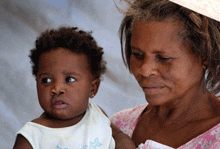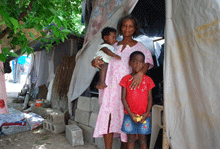Elsie Delva is from Carrefour Feuilles, a poor neighbourhood of Port-au-Prince. She lost everything in the earthquake. Like thousands of other women and men who lost their livelihoods, she has the right to start rebuilding her life.
We can rebuild our lives
 |
| Elsie Delva lost everything in the earthquake. She was injured and struggles to look after two orphaned children. Oxfam has supported them with grants and access to a community canteen. |
Elsie Delva is from Carrefour Feuilles, a poor neighbourhood of Port-au-Prince. She lost everything in the earthquake. Like thousands of other women and men who lost their livelihoods, she has the right to start rebuilding her life.
As one of the most vulnerable members of her community, she was selected as a beneficiary of one of the first community canteens that Oxfam opened in March. Since then, Oxfam has also supported her with grants of US$50 and US$100 so she could recapitalise her business and start earning a living again.
Elsie shares a tent with her neighbours. She looks after two orphaned girls and runs a small grocery stall outside her temporary home. She is sometimes late setting her goods out – she often doesn’t feel well as a result of the injuries she sustained in the earthquake.
“When the earthquake happened my house fell on top of me,” she says. “My clavicle was crushed. Some days I don’t feel well enough to work. After the earthquake I was stuck under the rubble from 5 o’clock in the afternoon until 9 o’clock the next night when they pulled us out. After that I suffered a lot from my injuries. And I had lost everything. I had nothing at all.
 |
| With the help of Oxfam grants, Elsie was able to re-open her small business. She hopes that in the future she will be able to expand and send the two children to school. Photo: Kateryna Perus. |
“Yet I had to take care of these children. Daphnee is 6 and I have been taking care of her for a long time. She was in the house with me when it collapsed and I fell on top of her; she was hurt too. And little Ali is 5 months old; her mother died 22 days after the earthquake, so I have been taking care of her too.
“After the earthquake things were very difficult. Then Oxfam started the canteens and we were able to eat every day for two months. That helped. And since then, Oxfam also gave me money. I bought some stock and opened this stall. It allows me to eat and to feed the children; feeding them is very expensive. I hope to be able to expand my business, that would make it much easier to live and then I would be able to send the children to school.”
Oxfam has a number of livelihoods programmes across the city, in areas that were badly affected by the earthquake where many people lost their means of earning a living. Over 15,000 of the most vulnerable people, like Elsie and her family, have been able to eat hot meals thanks to the community canteen programme. Once each canteen closes, Oxfam supports these families with a grant of US$50 to cover their most basic needs. This is followed by a livelihoods grant of US$100 to enable them to start earning a living again. In all, Oxfam’s livelihoods grant programme will support 30,000 families (roughly 150,000 people) over the next few months.



